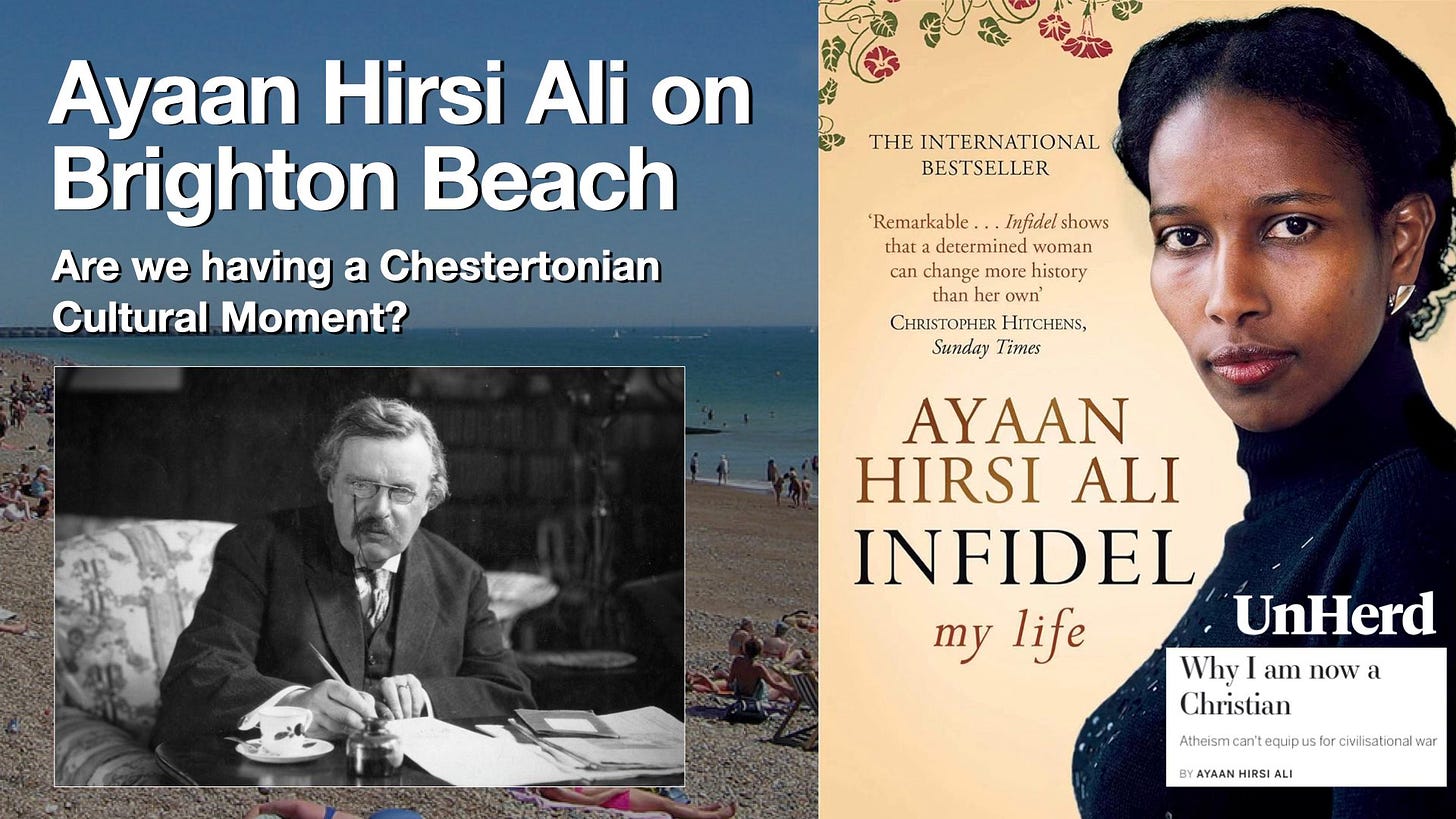“Describe the God you've rejected. Describe the God you don't believe in. Maybe I don't believe in that God either.” — Timothy Keller.
I’ve not sourced that quotation which is attributed to Tim Keller, but it’s a variation on something Christians have been saying for many years. It is borne out of frustration with those who refuse to believe in God based on their worst version of him in their heads, rather than how God is revealed in Scripture and supremely in Christ.
We are now living in a moment where we can push this phrase further. It’s not just that God isn’t how we might have imagined him. The God we crave is actually the God we have. So we might say, “Describe the God you would like. The good news is that is the God who is real.”
This has been the experience of Ayaan Hirsi Ali who has recently described herself as a ‘lapsed atheist’. Many have written about her recent article on Unherd entitled “Why I am now a Christian”. I don’t propose to add to those words, but merely to quote hers:
Unless we offer something as meaningful, I fear the erosion of our civilisation will continue. And fortunately, there is no need to look for some new-age concoction of medication and mindfulness. Christianity has it all…. That is why I no longer consider myself a Muslim apostate, but a lapsed atheist. Of course, I still have a great deal to learn about Christianity. I discover a little more at church each Sunday.
This is not so very different from the words GK Chesterton wrote in his introduction to Orthodoxy, written as a companion to another book, Heretics. I highly recommend both. I’m going to quote Chesterton at length as he describes what many now seem to be doing: discovering that the God they have been craving was there all along:
I have often had a fancy for writing a romance about an English yachtsman who slightly miscalculated his course and discovered England under the impression that it was a new island in the South Seas. I always find, however, that I am either too busy or too lazy to write this fine work, so I may as well give it away for the purposes of philosophical illustration.
There will probably be a general impression that the man who landed (armed to the teeth and talking by signs) to plant the British flag on that barbaric temple which turned out to be the Pavilion at Brighton, felt rather a fool…
But I have a peculiar reason for mentioning the man in a yacht, who discovered England. For I am that man in a yacht. I discovered England… I am the man who with the utmost daring discovered what had been discovered before. If there is an element of farce in what follows, the farce is at my own expense; for this book explains how I fancied I was the first to set foot in Brighton and then found I was the last. It recounts my elephantine adventures in pursuit of the obvious….
I did, like all other solemn little boys, try to be in advance of the age. Like them I tried to be some ten minutes in advance of the truth. And I found that I was eighteen hundred years behind it. I did strain my voice with a painfully juvenile exaggeration in uttering my truths. And I was punished in the fittest and funniest way, for I have kept my truths: but I have discovered, not that they were not truths, but simply that they were not mine.
When I fancied that I stood alone I was really in the ridiculous position of being backed up by all Christendom. It may be, Heaven forgive me, that I did try to be original; but I only succeeded in inventing all by myself an inferior copy of the existing traditions of civilized religion. The man from the yacht thought he was the first to find England; I thought I was the first to find Europe. I did try to found a heresy of my own; and when I had put the last touches to it, I discovered that it was orthodoxy.
Or to put it another way, the God that I wanted had been there all along. The God that my heart truly desired was the God who is revealed in Christ.
For further reflection on the idea that we have rediscovered Christianity, I not only recommend Glen Scrivener’s excellent book, The Air We Breathe, but also a series of vodcasts called Post-Christianity? he has made with Andrew Wilson, author of Remaking the World: How 1776 Created the Post-Christian West. There’s a YouTube version below.
In the meantime, can I remind readers that my book, The Gospel According to a Sitcom Writer is now available to listen to? For free. It’s not on Audible. It is being read chapter by chapter, week by week, by yours truly. Here it is on Apple Podcasts, or Spotify or wherever you get your podcasts (including YouTube).
My video from last week about what really happened at the General Synod in November 2023, as explained by a sitcom writer, is now on YouTube which makes sharing and discovery a little easier:
And here’s that Post-Christianity? on YouTube, as promised:





